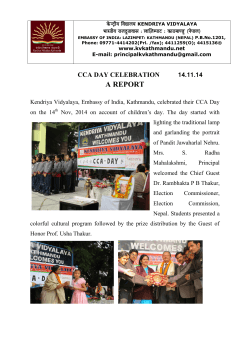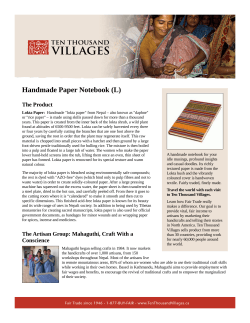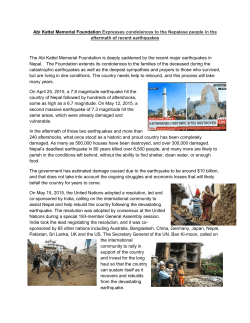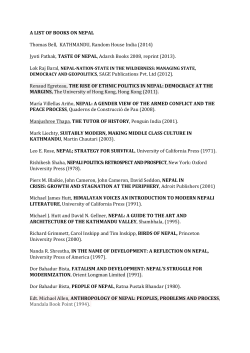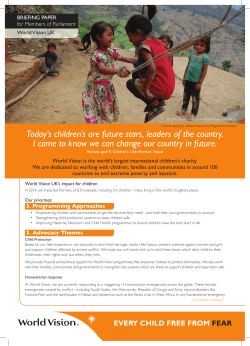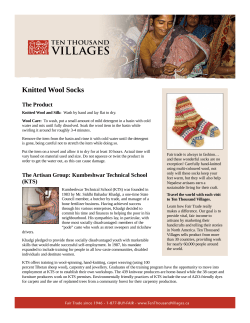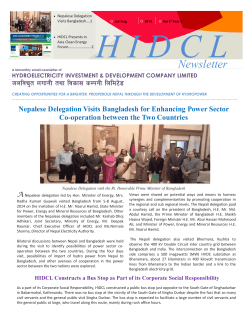
The Emerging Issues and Challenges of Nepalese Migrant Workers
The Emerging Issues and Challenges of Nepalese Migrant Workers Submission to the United Nations Universal Periodic Review by Advocacy Forum (AF) - Nepal and the Member Organizations of National Network for Safe Migration (NNSM) 23rd Session of the Working Group on the UPR Human Rights Council 22nd March 2015 I. Introduction 1. This report is a joint submission of Advocacy Forum (“AF”) and the National Network for Safe Migration (“NNSM”) to the United Nations Human Rights Council‟s Universal Periodic Report (“UPR”). This report pertains to human rights violations suffered by Nepali migrant workers (“workers”). 2. The contents of the report are derived from an extensive review of pertinent publications in this area; research studies; newspaper articles; migrant workers‟ cases provided by Pourakhi-Nepal1; first hand interviews of returnee migrant workers and/or their family members undertaken by Advocacy Forum; and evidence gathered from a seriesmulti-party consultation meetings2 organized by AF and NNSM on an array of issues concerning workers. 3. The issues discussed below are those that are mainly - but not entirely - applicable to those poorly educated, rural based, low skilled workers that mainly work in the Middle East and Malaysia; these individuals form the preponderance of workers. 1 Nepal based Human Rights organization A. Advocacy Forum and NNSM. Panel Discussion on Migrant Workers: Emerging Issues and Challenges, Access to Justice, 22nd October 2014. B. Advocacy Forum and NNSM. Consultation Meeting on Addressing the Emerging Medical Concerns of Migrant Workers, 29 th December 2014. C. Advocacy Forum and NNSM. Meeting with the Journalists on “Migrant Workers: Emerging Issues and Challenges”, 12 th January 2015. D. Advocacy Forum and NNSM. Consultation Meeting on the “Nexus between Human Trafficking and Migration: Addressing the intersectional issue.” 20th February, 2015. 2 4. This submission will first address the status of the implementation of worker specific recommendations in Nepal‟s previous UPR (2011), and then explore the most relevant and egregious violations of international human rights provisions by the State of Nepal in the context of foreign labour migration. II. Background 5. Foreign labor migration from Nepal has been rapidly accelerating in the past couple of decades as it has been a strategy of survival for many Nepalese men and women. Presently nearly half Nepali households have at least one member abroad or having returnee for foreign employment.3 The current trend of foreign labor migration from Nepal has been a major construct of the lack of employment within the country; increased globalization; effects of poverty; food insecurity; economic hardship; unequal distribution of income; lack of employment; and political unrest, war and insecurity.4 Consequently, more than 2.6 million Nepalese are currently undertaking overseas employment5, however this doesn‟t reflect the true number, as many travel undocumented and through hidden channels, and yet many more cross the open border with India frequently. 6. The growing tendency of foreign labor migration has placed Nepal as the top remittance recipient country among the Least Developed Countries (LDC) according to a report of the United Nations Conference on Trade and Development (UNCTAD).6 Figures further elucidate that daily average remittance amounts to NPR 1.49 billion and total remittance income in a fiscal year reaches NPR 543.29 billion.7 3 World Bank. 2011. „Large-Scale Migration and Remittance in Nepal: Issues, Challenges and Opportunities‟. Kathmandu: Poverty Reduction and Economic Management Sector Unit, South Asia Region, World Bank. 4 Knight, Kyle. “The subtle wounds of Nepal‟s remittance boom." Aljazeera, 13, 2014. http://www.aljazeera.com/indepth/features/2014/04/subtle=wounds=nepals=remittance=boom= 201441144741533395 [accessed January 12, 2015]. 5 Government of Nepal- Ministry of Labor and Employment. “Labor Migration for Employment- A Status Report for Nepal 2013/2014.” Department of Foreign Employment. 6 “Nepal top recipient among LDCs.” Ekantipur, December 18, 2014. http://www.ekantipur.com/2014/12/18/business/nepal-toprecipient-among-ldcs/399190.html [accessed January 5, 2015]. 7 “Country receiving Rs 1.49b in remittances daily.” Republica. 24 Aug. 2014. 7. Remittances have significantly contributed to the development of the nation and raised the mean living standards of its citizens, nevertheless, there have been overshadowing tragedies associated with it. Nepalese migrant workers have become high risk victims of recruitment malpractices, such as: forced labor; trafficking; sexual and physical harassment; debt bondage; fraudulent employment offers; racial bias and xenophobia; exorbitant placement fees; placement in perilous employment; under or non-payment of wages; and discriminating laws and policies in destination countries. 8. The core domestic legal provisions that deal with foreign employment are the Foreign Employment Act 2007 (“FEA”) and the Foreign Employment Rules (“FER”). III. Status of Implementation of UPR Recommendationsby Nepal 9. Nepal‟s previous UPR8had a minimal focus on the issue of foreign labour migration, however two accepted recommendations did address Human Rights issues in this area. The Government of Nepal despite failed to implement either of these. 10. Recommendation 1: “Strengthen the implementation of its Human Trafficking and Transportation (Control) Act 2007 and its Regulation 2008 (Bhutan); further strengthen law enforcement and the judicial system in the efforts to address impunity ……. (Malaysia)”9 It is widely accepted10that in the context of labour migration the provision related to the „Human Transportation” (Section 4(2)) is rarely used, despite the activities of many private actors in the foreign employment market contravening it. This is primarily because when such occurrences are presented to the police, public 8 Outcome of 2011 Nepal UPRhttp://daccess-dds-ny.un.org/doc/UNDOC/GEN/G11/116/42/PDF/G1111642.pdf?OpenElement [Accessed: 19/03/2015]. 9 Outcome of 2011 Nepal UPRhttp://daccess-dds-ny.un.org/doc/UNDOC/GEN/G11/116/42/PDF/G1111642.pdf?OpenElement [Accessed: 19/03/2015].paragraph 106.31. 10 Advocacy Forum and NNSM. Consultation Meeting on the “Nexus between Human Trafficking and Migration: Addressing the intersectional issue.” 20th February, 2015. prosecution service or judiciary, they are inaccurately dismissed as a migrant worker issue, and thus subject to the sole jurisdiction of the Department for Foreign Employment (DoFE).1112This action essentially leads to private actors that undertake human transportation evading criminal prosecution and in turn exacerbates the culture of impunity that exists in the foreign employment market. 11. Recommendation 2: “Protect its citizens from labour exploitation at home and abroad by providing improved regulation and oversight of workplace practices (United States of America)”13 With regard to improving regulation, the domestic legal framework in Nepal prior to 2011 and since 2011 is broadly adequate, albeit not ideal. The core problem with the regulatory framework for foreign employment in Nepal is the implementation of it. Although the Department of Foreign Employment has legal authority to implement and enforce the FEA 2007 and FEA 2008, it has failed to do so because of its significant lack of resourcing14, inefficiency and nexus with alleged perpetrators. The actions of the Government of Nepal in this regard are in violation of Article 8 of the UDHR, as it is not providing an effective remedy for workers‟ FEA and FER rights. 12. With regard to oversight of foreign workplace practices, this is a matter for Labour attachés and Embassies to undertake. The level of funding, staffing and expertise in which is dismal considering the number and amount of revenue generated by workers. Labour attachés, embassies and even the DoFE accept that given the lack of resource and the workload many of the functions of such institutions like screening 11 American Bar Association. 2011. Human Trafficking Assessment Tool Report for Nepal. Washington, D.C.: American Bar Association. http://www.americanbar.org/content/dam/aba/directories/roli/nepal/nepal_human_trafficking_assessment_report_2011.authcheckdam.pdf. 12 Ibid. 13 Outcome of 2011 Nepal http://daccess-dds-ny.un.org/doc/UNDOC/GEN/G11/116/42/PDF/G1111642.pdf?OpenElement [Accessed: 19/03/2015].paragraph 106.40. 14 Interview with Narayan Rimal, Director, Complaints Registration and Investigation Section, Department of Foreign Employment, Kathmandu, March 11, 2014. Contain within: Paoletti, Sarah, et al. "Migrant Workers' Access to Justice at Home: Nepal." Migrant Workers' Access to Justice Series (Open Society Foundations) (2014) employers and checking on the working and living conditions of employees are simply overlooked. 15 13. The lack of any actual mandate for embassies or labour attachés to screen, monitor and black list foreign employers is another major concern, and there has been no development in this area since 2011. IV. Violations of Human Rights 14. In the context of foreign labour migration, there are a vast number of Human Rights violations, but for the purposes of this submission the authors have focused on the 6 rights (listed below)that are perceived to be either the most egregious violations or the violations that have the greatest adverse effects on the lives of workers. V. Access to Justice Liberty of Movement Right to Equality and Non-discrimination Right to Work and to Just and Favorable Conditions of Work Right Against Exploitation: Forced Labor, Slavery and Human Trafficking Protection against Human Rights Abuses Perpetuated by Non-State Actors Access to Justice 15. Article 7 of the UDHR and Article 26 of the ICCPR guaranties that all individuals are afforded equal protection by the law, but Article 8 of the UDHR goes further and provides for an effective remedy with determination by a competent tribunal for all violations of national laws. Art. 2(3)(a) contains the same provision but for violations of the rights contained in the ICCPR. 15 Interview with Section Officer, Ministry of Foreign Affairs on 7 June 2012, Kathmandu . Contained within: Paoletti, Sarah, et al. "Migrant Workers' Access to Justice at Home: Nepal." Migrant Workers' Access to Justice Series (Open Society Foundations) (2014). Roshan Sedhai. 2014. “Lack of Human Resources: Migrants in Lurch as Embassy Staff Overworked.” The Kathmandu Post, February 24, 2014. http://www.ekantipur.com/the-kathmandu- post/2014/01/29/related_articles/lack-of-humanresources/258667.html [accessed May 1, 2014]. 16. With regard to workers, the Nepali government is in violation of Article 8 of the UDHR for the following reasons: DoFE investigations. 17. Usage of unlicensed brokers16; deceit over actual contractual terms of employment; delay in sending workers for foreign employment; contract substitution at the airport prior to departure; and conditions of work and housing that differ from pre oral/written representations are all acts undertaken by brokers or recruitment agencies that are offences under the FEA. Complaints for such can be made to the DoFE, and ultimately the perpetrator punished. However, the DoFE is heavily under resourced, consequently there is an ever expanding backlog of complaints that have yet to be investigated17. There are also allegations of corruption18. The Foreign Employment Tribunal 18. The Foreign Employment Tribunal (“Tribunal”) was established by the FEA and has jurisdiction to adjudicate on violations of the FEA and FER that are more serious, e.g. operating a foreign employment business without a license; sending workers for employment withoutDoFE permission; and concealing or tampering with relevant documents. The process for a complaint to get to the Tribunal is a lengthy bureaucratic process that is in dire need of streamlining: firstly the DoFE have to investigate it, then a government attorney reviews it, then it is given to the Tribunal registrar, then a prosecutor from the public prosecutor‟s office will be appointed to prosecute it. 19. The first issue is obtaining compensation notwithstanding successful prosecution against a perpetrator. This is particularly a problem where the offence is committed by a broker, which is one of the most common cases the Tribunal receives. This is because the Tribunal can only enforce an order for compensation when it is paid out of a recruitment agency‟s deposit, but as the unlicensed broker wouldn‟t have a deposit,the victim needs to go to a district court to enforce their order for 16 Unregistered Middle-men that link potential workers with registered and legally authorised recruitment agencies for the purpose of foreign employment. 17 Paoletti, Sarah, et al. "Migrant Workers' Access to Justice at Home: Nepal." Migrant Workers' Access to Justice Series (Open Society Foundations) (2014): 14-22, p152. 18 Paoletti, Sarah, et al. "Migrant Workers' Access to Justice at Home: Nepal." Migrant Workers' Access to Justice Series (Open Society Foundations) (2014): 14-22, p153. compensation19. The Deputy Attorney General of Nepal noted that as a result of the above procedures, “decision [or order] implementation was ineffective”20, this view was echoed by an eminent legal officer that deals with such cases21. 20. A study into the area 22 found that of 187 randomly selected cases that were filed at the DoFE for adjudication by the Tribunal, only 108 were recommended for prosecution by the appointed prosecutor, and only 10 were registered for a hearing at the tribunal. Thus, there are 98 cases that can and should be registered but are simply left „pending‟ at the DoFE for no material reason. In the above study, the legal director of the DoFE blamed resource constraints for this egregious situation23. Compensation for Negligent Pre-Departure Medical Examinations 21. All departing workers must undergo a medical examination prior to undertaking foreign employment24. A common occurrence25 is that workers are negligently given a clean bill of health, but are returned to Nepal because they fail a subsequent examination in their receiving country. Section 72 (2) of theFEA states that in the above scenario the medical center that provided the negligent or fraudulent medical test results must pay for the costs incurred by the worker to undertake foreign employment26. 22. Based upon the interviews undertaken of recruitment agencies, board members of one of the associations of recruitment companies and premature returnee workers27, it is evident that many such returnee workers either fail to receive any compensation 19 Foreign Employment Rules 2008, Rule 41. Interview with Tek Bahadur Ghimire, Government Attorney, Kathmandu, January 21, 2014. Contained within: Paoletti, Sarah, et al. "Migrant Workers' Access to Justice at Home: Nepal." Migrant Workers' Access to Justice Series (Open Society Foundations) (2014): 14-22, p113. 21 Interview with Rewat Prasad Kharel, advocate, Saviour Law Associates Pvt. Ltd., Dillibazar, Kathmandu, December 18, 2013. Contained within: Paoletti, Sarah, et al. "Migrant Workers' Access to Justice at Home: Nepal." Migrant Workers' Access to Justice Series (Open Society Foundations) (2014): 14-22, p113. 22 Paoletti, Sarah, et al. "Migrant Workers' Access to Justice at Home: Nepal." Migrant Workers' Access to Justice Series (Open Society Foundations) (2014): 14-22, p114-115. 23 Paoletti, Sarah, et al. "Migrant Workers' Access to Justice at Home: Nepal." Migrant Workers' Access to Justice Series (Open Society Foundations) (2014): 14-22, p114. 24 Section 19 of the FEA 25 Advocacy Forum and NNSM. Consultation Meeting on Addressing the Emerging Medical Concerns of Migrant Workers, 29th December 2014. 26 Rule 46 of the Foreign Employment Rules 2008 explains an expert committee whether a false health checkup report was prepared pursuant to s. 72 (3) FEA. 27 Amnesty International. 2011. False Promises: Exploitation and Forced Labour of Nepalese Migrant Workers. London: Amnesty International. p39 20 from the examining centre or it will be consistently less than what they actually incurred in undertaking and returning from foreign employment. Moreover, based on the figures given in the aforementioned interviews, compensation was routinely less than the government prescribed maximum chargeable recruitment fees, which are nearly always exceeded by the industry.28Given the systematic underpayment of compensation; failure to provide compensation generally; and failure to adequately adjudicate in instances of dispute over negligenceclearly demonstrates that the DoFE are failing to enforce s.72 (2) FEA. 23. The Government of Nepal is violating Article 8 UDHR by:failing to adequately investigate, punish and require perpetrators to furnish workers with compensation, and thus an effective remedy, for violation of workers‟ FEA rights; not providing an effective remedy for the violation of the right of workers to have their complaint adjudicated by the Tribunal, due to perceived or actual resource constraints (paragraph 20 above); not providing an effective mechanism to compensate workers in cases such as detailed in paragraph 19 (above); and not providing an effective remedy to the violation of workers‟ right to compensation as granted by s.72 (2) FEA. VI. Liberty of Movement 24. Article 12 of the ICCPR bestows upon lawful workers the right to move to any part of that state and reside wherever they like within it. Further, it provides that a worker may leave any country. This right can only be qualified if said qualification is provided by law; and necessary to protect national security, public health, freedoms of others or other rights in the ICCPR. Article 13 of the UDHR echoes this but in a simplified version. Thus, the state of Nepal has an obligation to protect the above right to liberty of movement for its workers. 28 Amnesty International interviews with Kumud Khanal, NAFEA Secretary General, in Kathmandu Nepal on 26 November 2010 and Kamal Tamang, NAFEA Secretary, in Kathmandu, Nepal on 26 25. A study into this area revealed that of the 43 interviewed returnee workers, 27 had their passport confiscated upon arrival at their destination airport.29In Amnesty International‟s 2011 study this was 58 out of 60.30The logic behind this is that if employers keep the passport of their workers, the latter cannot flee adverse working conditions or the country. Of the 58 in the above Amnesty International study 18 interviewees even requested there passports back and were refused. The practice of confiscation of passports was endorsed and encouraged by recruitment agency owners and all Nepal Association of Foreign Employment Agencies31 board members.32 Even more alarming, the DoFE and Foreign Employment Promotion Board of Nepal were aware of recruitment companies endorsing this behaviour and saw the practice by foreign employers as “understandable”.33 26. While violations of Human Rights provisions by foreign employers themselves is a primarily a matter of concern for their countries, allowing this practice to occur would be a violation of Article 12 of the ICCPR by the Government of Nepalgiven their knowledge of it. This is because pursuant to Article 12 (ICCPR) the state of Nepal has a positive obligation to protect liberty of movement and protect the right for an individual to leave any country while that individual is subject to its jurisdiction (Art. 2 (1) ICCPR). A worker would be subject to Nepal‟s jurisdiction by simple virtue of them being a Nepali citizen. This positive obligation axiomatically would apply to preventing workers attending employment where it knows their Article 12 rights will be infringed – even if that be outside their jurisdiction – in this case the DoFE is aware of this practice and its intent. Thus, the Government of Nepal has violated workers‟ Article 12 (ICCPR) rights by allowing them to attend foreign employment even in a situation where it knows and accepts that the workers will neither be free to leave the country at will,nor will they be free to leave the locality of 29 Paoletti, Sarah, et al. "Migrant Workers' Access to Justice at Home: Nepal." Migrant Workers' Access to Justice Series (Open Society Foundations) (2014): p71. 30 Amnesty International. 2011. False Promises: Exploitation and Forced Labour of Nepalese Migrant Workers. London: Amnesty International. p63 31 1 of the 2 Trade Associations for foreign employment agencies in Nepal: http://www.nafea.org.np 32 Amnesty International interview with Somlal Batajoo, NAFEA President, in Kathmandu, Nepal on 28 November 2010. Amnesty International interview with Trilok Chand Vishwas, NAFEA Vice-President, in Kathmandu, Nepal on 28 November 2010. Amnesty International interview with Kumud Khanal, NAFEA Secretary General, in Kathmandu Nepal on 26 November 2010. Amnesty International interview with Kamal Tamang, NAFEA Secretary, in Kathmandu, Nepal on 26 November 2010. 33 Amnesty International meetings with the Department of Foreign Employment in Kathmandu, Nepal on 10 December 2010 and the Foreign Employment Promotion Board in Kathmandu, Nepal on 2 December 2010. their employer as their passport and other identity documents get confiscated upon their arrival. 27. To reasonably discharging the state of Nepal‟s duty under Art. 12 (ICCPR), the state should take some positive protective action: Embassy‟s and Labour Attachés should be black listing foreign agencies and employers that undertake this practice of passport confiscation, but given the vast under resourcing and varying practices screening and reporting on employers and foreign agencies does not occur. The DoFE should also monitor and take action against recruitment companies and brokers that are complicit and encourage such activity, as does occur34. 28. There is wide scale reporting of movements of domestic workers being severely controlled by their employers35, this also occurs for other types of employment but to a lesser degree. In the Amnesty International 2011 study 14 out of the 17 domestic workers interviewed stated that they were prevented from leaving the house alone and were “locked in” when their employers left the house.36 Given the wide scale knowledge of these practices occurring, for the Government of Nepal to begin todischarge their duty under Art 12 (ICCPR), there should be a monitoring system in Embassies and Labour Attachés to: check on domestic workers; offer support; refer cases to the police of the destination country; offer alternative employment; or repatriate such persons in cases of restrictions on freedom of movement rights. Thus, given the absence of this system in any systemic manner, the Government of Nepal isviolating its Article 12 ICCPR obligations. VII. 34 Right to Equality and Non-discrimination Trilok Chand Vishwas, NAFEA Vice-President: “Migrant workers run away many times to better paying jobs. Companies make us pay a penalty for the visa charge, so the removal of identity documents is a good idea because not all migrant workers are honest.” Amnesty International interview with Trilok Chand Vishwas, NAFEA Vice-President, in Kathmandu, Nepal on 28 November 2010. 35 Advocacy Forum and NNSM. Panel Discussion on Migrant Workers: Emerging Issues and Challenges, Access to Justice, 22 nd October 2014. 36 Amnesty International. 2011. False Promises: Exploitation and Forced Labour of Nepalese Migrant Workers. London: Amnesty International. P67. 29. The principles of non-discrimination and equality: which require States to treat all its citizens equally without any partiality or preference are enshrined in the UDHR, ICCPR and ICESCR. Nepal is also a party to CEDAW which clearly prohibits discrimination based on gender; Article 2(e) states: that States should “take all appropriate measures to eliminate discrimination against women by any person, organization or enterprise”. This right is also enshrined in the Interim Constitution of Nepal 200737. 30. The existing policy of the Government of Nepalbans female workers under 30 from undertaking foreign employment in Gulf countries.38The Government of Nepal claims that the restriction was imposed because of complaints, including physical and sexual abuse, and poor working conditions of women workers, and that the age restriction is meant to protect younger, potentially more vulnerable female migrant workers. However, this restriction has not notably reduced the number of female workers under 30 going to Gulf countries; instead, reports reveal that there arenumerous undocumented female workers, and that the ban has only pushed them into situations of exploitation and abuse rather than protecting them, by virtue of them needing to undertake such employment through higher risk illegal channels.39The Nepalese embassy in Riyadh estimates that 40,000 Nepali women, who came through illegal channels, are working in Saudi Arabia, and that the embassy has so far rescued and repatriated only about 300 women who had faced physical, economic and psychological exploitation at the hands of their employers.40 Al Jazeera states “Nepali migrant workers are easy targets of abuse,” and the major reason behind this is again the fact that many Nepalese women are working illegally. The evidence above,as well as the conclusion driven from CEDAW recommendation No. 26 on Women Migrant Workers41suggests that making women workers travel 37 Article 13 (1) of the guarantees the right to equality, which states that all citizens shall be equal before the law, and Article 13 (3) clearly states that the State shall not discriminate against citizens on grounds of sex, among others. 38 Paoletti, Sarah, et al. "Migrant Workers' Access to Justice at Home: Nepal." Migrant Workers' Access to Justice Series (Open Society Foundations) (2014). 39 Ramyata Limbu. 2014. “Nepal‟s migrant workers easy targets for abuse.” Aljazeera, June 1 2014. http://www.aljazeera.com/indepth/features/2014/05/nepal-migrant-women-easy-targets-abuse-201452710154969825.html [accessed September 28, 2014.] 40 Roshan Sedhai. 2014. "Female migrant workers: Govt may lift ban, on safety condition.” Ekantipur, December 5 2015. http://www.ekantipur.com/2014/12/05/editors-pick/female-migrant-workers-govt-may-lift-ban-on-safety-condition/398571.html [accessed February 15, 2014.] 41 CEDAW. 2008. “General recommendation No. 26 on women migrant workers.” December 5, 2008. http://www2.ohchr.org/english/bodies/cedaw/docs/GR_26_on_women_migrant_workers_en.pdf [accessed February 5, 2015]. through illegal channels can make them more vulnerable and keep them at higher risk of being exploited. 31. The restriction policy is also contrary to the various international human rights conventions as stated in paragraph 29, as itis prima facie discriminatory and treats women in the context of foreign labour migration less favorably. Further, it is ineffectual in its presented intent for the reasons set out in paragraph 30. VIII. Right to Work and to Just and Favorable Conditions of Work 32. Article 6 of the International Convention on Economic, Social and Cultural Rights (1966) (ICESCR) states that State Parties to the Covenant must recognize “the right to work, which includes the right of everyone to the opportunity to gain his living by work which he freely chooses or accepts.”42 Furthermore, Article 7 (ICESCR) stipulates the right of everyone to the enjoyment of just and favorable conditions of work, and sets particular standards to be guaranteed by the State, which includes equal remuneration, safe and healthy working conditions, rest, leisure and reasonable limitation of working hours and periodic holidays. The aforementioned rights are also echoed in Articles 23 and 24 of the UDHR. 33. Nepalese migrant workers‟ right to work in just and favorable conditions as stipulated in the UDHR and the ICESCR has been violated for the reasons set out in paragraphs 33-35. Many migrant workers have been dying due to dangerous conditions at work, and appalling living environments, as workers are cramped in filthy living quarters- which is a clear violation of their right to adequate standards of living as enshrined in Article 25 of the UDHR.43 Likewise, many Nepalese workers have also been denied access to free drinking water in the desert heat and 42 United Nations. “International Covenant on Economic, Social and Cultural Rights (1966).” http://www.ohchr.org/EN/ProfessionalInterest/Pages/CESCR.aspx [accessed January 1, 2015] 43 Robert Booth. “Qatar World Cup construction 'will leave 4,000 migrant workers dead.‟” The Guardian, September 26, 2013. http://www.theguardian.com/global-development/2013/sep/26/qatar-world-cup-migrant-workers-dead [accessed September 28, 2014.] many have sought refuge at Nepalese embassies to escape the brutal conditions of their employment. 34. Migrant workers are also misinformed about their working hours, these being significantly longer than agreed in Nepal.44 According to the Amnesty International‟s report, migrants in Malaysia are often forced to work for more than 12 hours a day in hazardous situations against their will, and many have also become victims of physical, verbal and sexual abuse, again contrary to Article 7 of ICESCR. 35. Nepalese migrant workers have also encountered violations of their right to a just remuneration. For instance, there are examples where the workers have received only 130 USD per month in the destination country, despite the recruiting agencies in Nepal making them sign contracts worth of 320 USD before leaving Nepal,45 this being contrary to the right to a just and favorable wage. 36. Almost all employers confiscate the passports of their workers, placing the latter at a higher risk of being arrested, preventing them from leaving abusive workstations and exposing them to exploitative and coercive practices at work. This is a direct violation of “the right of everyone to the opportunity to gain his living by work which he freely chooses or accepts”(Article 6 (ICESCR)), as it removes the workers' right to leave their place of work. 37. The above violations regarding work conditions are primarily violations by the destination country where this occurs; but the state of Nepal has a positive obligation to not expose, or minimize its citizens‟ exposure to violations of Article 6 and 7 of ICESCR. Thus, the state of Nepal is in violation of Article 6 and 7 of ICESCR, as it has made no efforts. As a bare minimum to discharge their duty, the state would be 44 Pete Pattison. 2013. “Revealed: Qatar‟s World Cup „slaves.‟ The Guardian, September 25, 2013. http://www.theguardian.com/world/2013/sep/25/revealed-qatars-world-cup-slaves [accessed January 1, 2014]. 45 Amnesty International. 2011. False Promises: Exploitation and Forced Labour of Nepalese Migrant Workers. London: Amnesty International. p. 53. expected to screen and monitor the work conditions of places of employment that host large numbers of migrant workers46;further, it should quash practices like contract substitution, and offer redress and repatriation to workers that complain that their workconditions are contrary to what was agreed prior to leaving Nepal.47 IX. Right against Exploitation -Forced labor, Slavery and Human Trafficking 38. All forms of exploitation, including slavery, human trafficking and forced labor which are considered to be the cruelest forms of exploitation - have been proscribed by UN international treaties and conventions. For instance, Article 1 of the ILO Convention concerning the Abolition of Forced Labor 1957 (No.105), to which Nepal became a signatory in 2007, directs each State parties“to suppress and not to make use of any form of forced or compulsory labor, or use forced labor for purposes of economic development.”48 Similarly, in order to discourage forced labor, ILO adopted Forced Labor Convention in 1930 (No.29) to which Nepal became a signatory in 2002.49 This Convention (Article 1(1)) creates an obligation to suppress the use of forced or compulsory labor in all its forms within the shortest possible period. Similarly, Article 4 of the UDHR prohibits slavery; and human trafficking, which is considered as modern day slavery, many international instruments have also banned them,50 including the UN Trafficking Protocol (2000). The right against exploitation has further been stipulated in Article 29 of the Interim Constitution of Nepal (2007) and it prohibits human trafficking, slavery, servitude, and forced labor. 39. The indicators of exploitation, nevertheless, are frequently experienced by Nepalese migrant workers, which include retention of identity documents, including passports 46 Interview with Section Officer, Ministry of Foreign Affairs on 7 June 2012, Kathmandu. Contained within: Paoletti, Sarah, et al. "Migrant Workers' Access to Justice at Home: Nepal." Migrant Workers' Access to Justice Series (Open Society Foundations) (2014). 47 Advocacy Forum and NNSM. Consultation Meeting- Addressing the Emerging Medical Concerns of Migrant Workers, 29th December 2014. 48 International Labor Organization. Abolition of Forced Labour Convention, 1957 (No. 105). 49 International Labor Organization. Forced Labor Convention, 1930 (No.29). 50 Other relevant treaties include the Slavery Convention (1926) and the Supplementary Convention on the Abolition of Slavery, the Slave Trade, and Institutions and Practices Similar to Slavery (1956). Additional tools of international law that include segments against the trafficking of persons include: the Universal Declaration of Human Rights (1948), the International Covenants on Civil and Political Rights (1966), The United Nations Convention for the Suppression of the Traffic in Persons and of the Exploitation of the Prostitution of Others (1949), and the Convention on the Elimination of all Forms of Discrimination Against Women (1979). and travel documents; withholding of wages; threat of denunciation to the authorities; exacting excessive overtime work; physical and sexual abuse; and isolation. For example, the investigation by Guardian revealed evidence of forced labor on the World Cup infrastructure project in Qatar. It further disclosed that Nepalese workers were not receiving fair wages, many were denied payment for months, there had been increased practice among the employers to retain the earnings of migrant workers, 51 and the employers also refusing to issue identity cards, thus reducing the workers illegal immigrants status52; all of which are against the right to exploitation as detailed in the human rights treaties in paragraph 38 (above). 40. Similarly, many domestic workers in the Middle East were found to be exploited because of their lack of incorporation in domestic labour laws, and thus their recourse to the courts for access to justice was almost impossible.53 Cases of sexual abuse and rape of Migrant Workers in Saudi Arabia, including other Gulf nations was found to be common.5455 In Lebanon, the vulnerability of domestic workers was compounded because there existed elements of trafficking for forced labor and employers frequently undertook the practice of locking the workers in their house or forbidding them from leaving the house.5657 These human rights violations are indicative of exploitation, which are prohibited by UN trafficking protocol, and the ILO conventions detailed above. 41. It can legitimately be argued that the State of Nepal has created a domestic environment that is conducive to exploitation of workers. By not taking sufficient or effective action against recruitment agencies and brokers for clear violations of the FEA and FER, it has fostered an environment of impunity where private actors can 51 Pete Pattison. 2013. “Revealed: Qatar‟s World Cup „slaves.‟ The Guardian, September 25, 2013. http://www.theguardian.com/world/2013/sep/25/revealed-qatars-world-cup-slaves [accessed January 1, 2014]. 52 Ibid. 53 Amnesty International. “Malaysia must End Abuse of Migrant Workers. Amnesty International, March 24, 2010. “http://www.amnesty.org/en/news-and-updates/report/malaysia-must-end-abuse-migrant-workers-2010-03-24 [accessed September 12, 2014]. 54 Human Rights Watch. 2004. “Bad Dreams: Exploitation and Abuse of Migrant Workers in Saudi Arabia.” Human Rights Watch, July 14, 2004. 55 Paoletti, Sarah, et al. 2014. "Migrant Workers' Access to Justice at Home: Nepal." Migrant Workers' Access to Justice Series (Open Society Foundations) (2014). 56 Anti-Slavery International. 2012. “What is She Worth?” Kafa, June 2012. http://www.kafa.org.lb/StudiesPublicationPDF/PRpdf-58-635050125360662052.pdf [accessed January 21, 2015]. 57 Ibid. freely undertake actions like: not paying duly owed compensation;carrying out contract substitutions; trafficking;deceiving over contractual terms; and greatly overcharging on recruitment fees, which leave workers heavily debt laden and which facilitate and amount to exploitation when amalgamated with activities undertaken in receiving countries. Thus, given the above, the State of Nepal, by facilitating the basis of this exploitation, is acting in contrary to the human rights and labour provision mentioned in paragraph 38. X. Protection against Human Rights abuses perpetuated by non-state actors 42. The exploitation and abuse of Nepalese migrant workers by recruiting agencies and medical centers occur before they even leave home. The Ruggie principle, endorsed by the UN Human Rights Council in June 2011, consists of provisions that specify the States duty “to protect against human rights abuses by third parties, including business, through appropriate policies, regulation, and adjudication; the corporate responsibility to respect human rights, which means to act with due diligence to avoid infringing on the rights of others; and greater access for victims to effective remedy, judicial and non-judicial.” Based on this guideline, the Government of Nepal is obliged to protect against human rights abuses and exploitations perpetuated to workers by non-state actors. However, the Government of Nepal has failed to monitor recruitment agencies and medical centers, which have been perpetuating abuse and the exploitation on workers. 43. It is widely acknowledged that workers are abused in their home country by the recruitment agencies and brokers, who are responsible for sending these workers oversees.58 Workers are deceived with regard to salary,59 nature of work (where the recruitment agencies tend to acquire workers‟ consent for one kind of role then compel workers to undertake a role of a differing nature in the destination country)60 58 Roshan Sedhai. 2014. “Labour Ministry told to profile manpower firms.” Ekantipur, November, 12 2014. http://www.ekantipur.com/the-kathmandu-post/2014/11/11/related_articles/labour-ministry-told-to-profile-manpowerfirms/269548.html [accessed February 10, 2015]. 59 A. Advocacy Forum and NNSM. Panel Discussion on Migrant Workers: Emerging Issues and Challenges, Access to Justice, 22nd October 2014. B. Advocacy Forum and NNSM. Consultation Meeting on Addressing the Emerging Medical Concerns of Migrant Workers, 29 th December 2014. 60 A. According to the International Labor Organization, “intermediaries who carry out abusive recruitment practices, which negate freedom of choice by the worker (…) with the deliberate intent of placing persons in a situation in which forced labor can and employment contracts (in many occasions, the workers sign two different contracts, one formal contract they use to get approval from DOFE to acquire a labor permit and the second is the functioning contract, that often fails to incorporate minimum standards of foreign employment and protections for their human rights.)61Similarly, migrant workers have also been facing exploitations at the hands of medical centers within the country, as the centers have been providing negligent health facilities/services to workers, and thus compounding their health risks. The findings unveil that many migrant workers fall prey to fraudsters, who issue fake medical certificates to the migrant workers without conducting proper and accurate medical examinations. As a result, many migrant workers fail subsequent medical tests at the destination country and are sent back to Nepal. The majority of health certificates issued by health centers, though carry government issued hologram as well as a doctor‟s stamp and signature, bear serious medical flaws.6263 The government has also been incapable, or has failed to take any action against the medical centers for their lack of adherence to the law regarding the medical examination costs, some centers continue to charge higher fees than the government prescribed maximum for the pre-departure medical examination. 44. Though the recruiting agencies and medical centers- whose actions have direct bearing to the wellbeing of migrant workers- have the responsibility to adhere to international human rights standards as enshrined in the Ruggie principle, these entities have failed to meet such obligations for workers. The failure of the Government of Nepal to protect these workers via legislation, policy and enforcement against the aforementioned actions of private actors is therefore a clear violation of workers‟rights against exploitation. be exacted from them can certainly be considered as accomplices to forced labor” (ILO, The Cost of Coercion, Global Report under the follow-up to the ILO Declaration on Fundamental Principles and Rights at Work, 2009, para38. http://www.ilo.org/wcmsp5/grroups/public/@ed_norm/@relconf/documents/meetingdocument/wcms_106230.pdf [accessed December 15, 2014]. B. Ganesh Gurung. 2004. “An Overview Paper on Overseas Employment in Nepal.” International Labor Office in Nepal, 2004. http://www.ilo.org/wcmsp5/groups/public/@asia/@ro-bangkok/@ilo-kathmandu/documents/publication/wcms_116815.pdf [accessed 14 March, 2015]. C. Advocacy Forum and NNSM. Panel Discussion on Migrant Workers: Emerging Issues and Challenges, Access to Justice, 22 nd October 2014. D. Advocacy Forum and NNSM. Consultation Meeting on Addressing the Emerging Medical Concerns of Migrant Workers, 29 th December 2014. 61 Hom Karki. 2013. “Nepal, Qatar sign 15-point pact.” Ekantipur, July 2nd, 2013. http://www.ekantipur.com/the-kathmandupost/2013/07/01/money/nepal-qatar-sign-15-point-pact/250688.html [accessed January 5, 2014]. 62 Ishwar Rauniyar. 2013. “Migrant Woes.” My Republica: Nepal. September 7, 2013. 63 Weena Pun & Manish Gautam. “Medical negligence painful to fight.” Kathmandu Post, April 14, 2013. XI. Recommendations 45. The following practical and achievable short to medium term recommendations that State of Nepal can implement independently are advised as a minimum: a. Increase the resources of DoFE and Tribunal to a level commensurate with the degree to which Nepal‟s economy relies on migrant workers‟ remittances. Such that it can address complaints; adjudicate on cases; punish violations of the FEA and FER; and regulate private actors adequately. b. Provide adequate guidance and training to the police, prosecution service and judiciary to recognize the offences of trafficking and transportation in the context of foreign employment, and have them dealt with and prosecuted as criminal offences as opposed to being dealt with under the FEA regime. c. Clarify the mandate of Nepalese Embassies and Labour Attachés to include: screening and blacklisting foreign recruitment agencies and employers; monitoring working conditions; referring appropriate violations of international and domestic law to the local police; and generally offering support required by workers. d. Greatly increase Embassy and Labour Attaché resources to a level that iscommensurate with the degree to which Nepal‟s economy relies on migrant workers‟ remittances. Such that it can adequately deal with the clarified mandate in paragraph 45c above. e. Recognize that undocumented women migrant workers are more vulnerable to exploitation64 and abuse in the hands of perpetrators because of their illegal immigration status. Therefore, repeal the discriminatory national 64 CEDAW General Recommendation No. 26 on Women Migrant Workers (2009) has recognized this. legislation/policy that prohibits women migrant workers under 30traveling to Gulf countries to undertake foreign employment. f. Carefully scrutinize and review contracts provided to migrant workers so that it incorporates minimum standards of labor laws, such as: fair vacation days, just remuneration, favorable conditions of work, etc. g. Take measures to ensure awareness among workers on issues related to the possibility of issuing dual contracts/fake contracts etc. by recruitment agencies or employers, and disseminate such information in their predeparture orientation training. h. Adequately regulate and frequently monitor recruitment agencies and medical centers to avoid the risk of exploitation they perpetuate on migrant workers. i. Actively engage in negotiating bilateral agreements with major labor receiving States, so as to ensure the protection of workers‟ Human Rights in the destination countries.
© Copyright 2025

